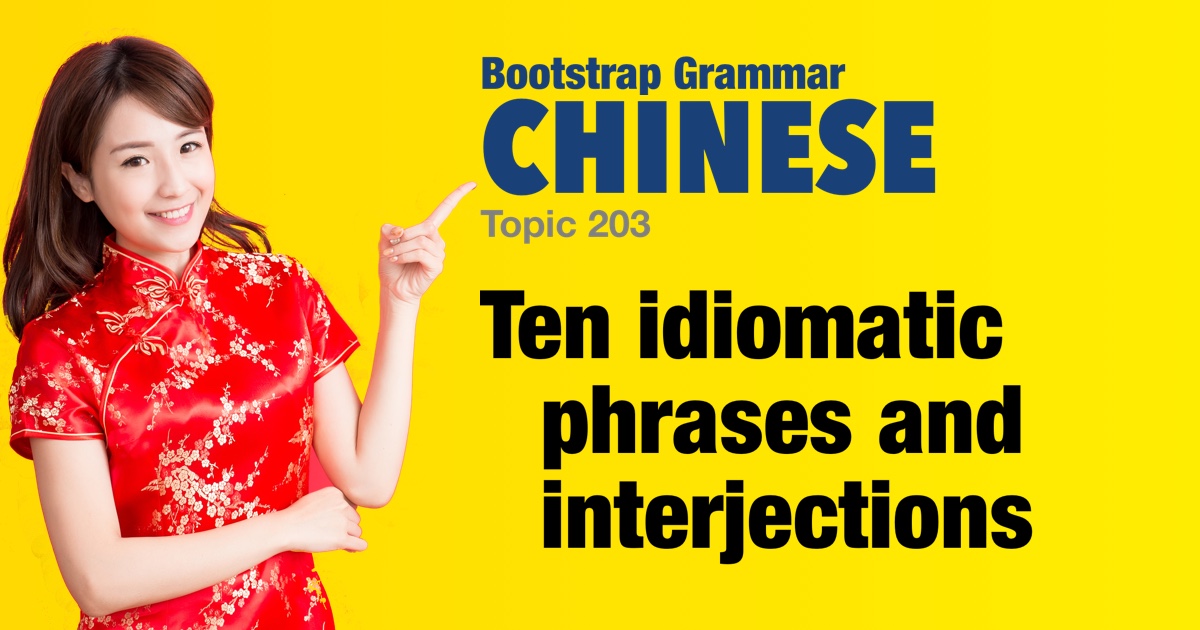Chinese grammar - Ten idiomatic phrases and interjections |
|||
|
|||
Here are 20 sentences that use ten different idiomatic phrases that are very commonly used in colloquial spoken Mandarin Chinese. |
| Examples: | |
|
哇塞,你的新车真酷!
wāsāi,#nǐ de xīn chē zhēn kù! Wow, your new car is really cool!
|
|
|
哇塞,这道菜太好吃了!
wāsāi,#zhè dào cài tài hǎochī le! Wow, this dish is so delicious! |
|
|
你想借我钱?没门儿!
nǐ xiǎng jiè wǒ qián? méiménr! You want to borrow money from me? No way!
|
|
|
他喜欢吹牛,说自己是亿万富翁。
tā xǐhuān chuīniú,#shuō zìjǐ shì yìwàn#fùwēng. He likes to brag, saying he is a billionaire.
|
|
|
别吹牛了,没人会信你的。
bié chuīniú le,#méirén huì xìn nǐ de. Stop bragging, no one will believe you.
|
|
|
我今天累死了,不想动。
wǒ jīntiān lèisǐle,#bùxiǎng dòng. I'm exhausted today, I don't want to move.
|
|
|
你跑了这么远,肯定累死了。
nǐ pǎo le zhème yuǎn,#kěndìng lèisǐ le. You ran so far, you must be exhausted.
|
|
|
这电影还凑合。
zhè diànyǐng hái còuhe. This movie is just okay.
|
|
|
他做的饭凑合,还能吃。
tā zuò de fàn còuhe,#háinéng chī. His cooking is passable, still edible.
|
|
|
甭客气,这是我应该做的。
béng kèqi,#zhè shì wǒ yīnggāi zuò de. Don't mention it, it's what I should do.
|
|
|
甭担心,事情会好起来。
béng dānxīn,#shìqing huì hǎo qǐlai. Don't worry, things will get better. |
|
|
我在等朋友,打发时间。
wǒ zài děng péngyou,#dǎfa shíjiān. I'm waiting for a friend, killing time.
|
|
|
读书是我打发时间的方式。
dúshū shì wǒ dǎfa shíjiān de fāngshì. Reading is my way of killing time.
|
|
|
不好意思,我来晚了。
bùhǎoyìsi,#wǒ lái wǎn le. Sorry, I'm late.
|
|
|
不好意思,我不小心撞到你了。
bùhǎoyìsi,#wǒ bùxiǎoxīn zhuàngdào nǐ le. Sorry, I accidentally bumped into you.
|
|
|
拜托,帮我拿一下这个箱子。
bàituō,#bāng wǒ ná yíxià zhè ge xiāngzi. Please, help me carry this suitcase.
|
|
|
拜托,别再烦我了。
bàituō,#bié zài fán wǒ le. Come on, stop bothering me. |
|
|
好久不见,你最近忙什么?
hǎojiǔ#bújiàn,#nǐ zuìjìn máng shénme? Long time no see, what have you been busy with lately?
|
|
|
好久不见,我们一起吃个饭吧。
hǎojiǔ#bújiàn,#wǒmen yìqǐ chīge fàn ba. Long time no see, let's have a meal together.
|
|
 |
|



